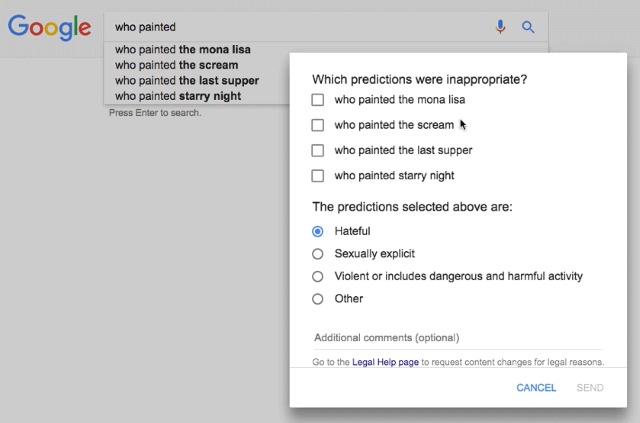Google tweaks search algorithms to fight fake news and 'offensive' content

The fight against fake news continues, with Google announcing not only changes to search algorithms to help prevent false information from rising to the surface, but also new tools to allow users to report "unexpected, inaccurate or offensive" results.
While the algorithm tweaks should impact on general search results, the reporting tools have been designed for Google's Autocomplete predictions and Featured Snippets which have been problematic in recent months. Updated algorithms should help to ensure more authoritative pages receive greater prominence, while low-quality content is demoted.
Vice president of engineering at Google Search, Ben Gomes, admits that people have been trying to "game" the system -- working against the spirit of the purpose of algorithms -- to push poor-quality content and fake news higher up search results. He says that the problem now is the "spread of blatantly misleading, low quality, offensive or downright false information."
In a blog post he announces two key changes that he believes will help tackle the problem:
New Search Quality Rater guidelines: Developing changes to Search involves a process of experimentation. As part of that process, we have evaluators -- real people who assess the quality of Google's search results -- give us feedback on our experiments. These ratings don't determine individual page rankings, but are used to help us gather data on the quality of our results and identify areas where we need to improve. Last month, we updated our Search Quality Rater Guidelines to provide more detailed examples of low-quality webpages for raters to appropriately flag, which can include misleading information, unexpected offensive results, hoaxes and unsupported conspiracy theories. These guidelines will begin to help our algorithms in demoting such low-quality content and help us to make additional improvements over time.
Ranking changes: We combine hundreds of signals to determine which results we show for a given query -- from the freshness of the content, to the number of times your search queries appear on the page. We've adjusted our signals to help surface more authoritative pages and demote low-quality content, so that issues similar to the Holocaust denial results that we saw back in December are less likely to appear.
Google's Automcomplete and Feature Snippets have both caused controversy recently for surfacing content that has not only been inaccurate, but has upset people. Google clearly wants to minimize the distress it causes its users, hence the introduction of a new feedback feature. Any reports that are received will be used to improve algorithms further down the line.

Gomes explains:
Starting today, we’re making it much easier for people to directly flag content that appears in both Autocomplete predictions and Featured Snippets. These new feedback mechanisms include clearly labeled categories so you can inform us directly if you find sensitive or unhelpful content. We plan to use this feedback to help improve our algorithms.
Image credit: Stefano Garau/Shutterstock